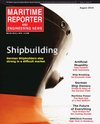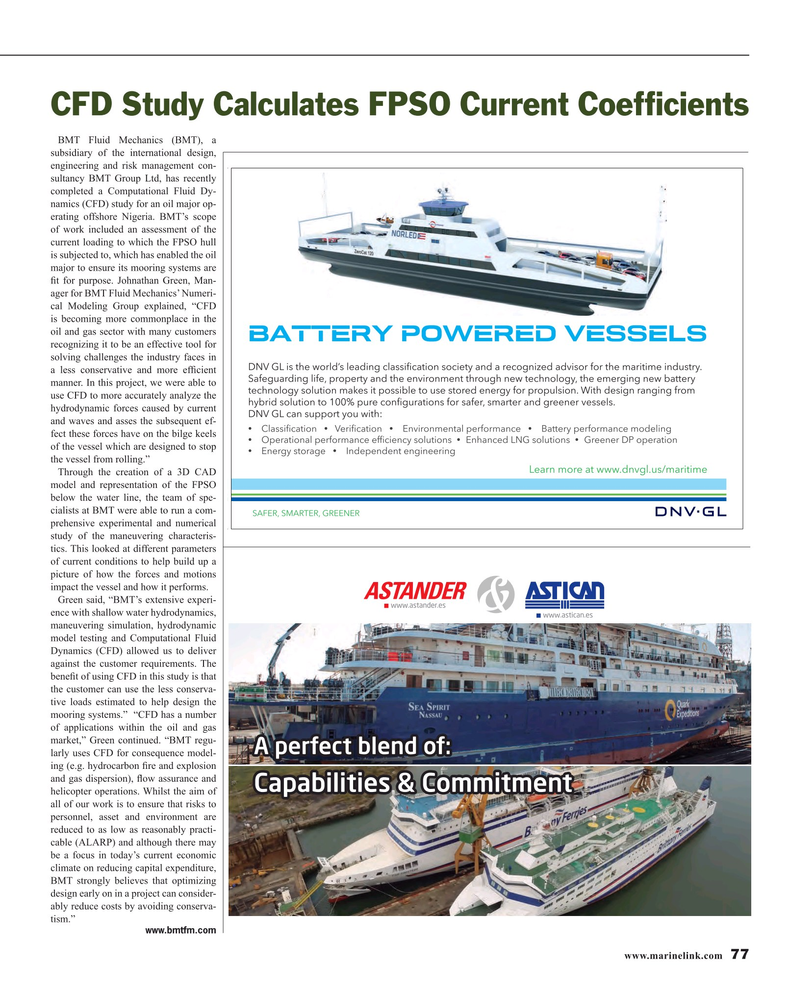
Page 77: of Maritime Reporter Magazine (August 2016)
The Shipyard Edition
Read this page in Pdf, Flash or Html5 edition of August 2016 Maritime Reporter Magazine
CFD Study Calculates FPSO Current Coef? cients
BMT Fluid Mechanics (BMT), a subsidiary of the international design, engineering and risk management con- sultancy BMT Group Ltd, has recently completed a Computational Fluid Dy- namics (CFD) study for an oil major op- erating offshore Nigeria. BMT’s scope of work included an assessment of the current loading to which the FPSO hull is subjected to, which has enabled the oil major to ensure its mooring systems are ? t for purpose. Johnathan Green, Man- ager for BMT Fluid Mechanics’ Numeri- cal Modeling Group explained, “CFD
ECAP propeller by MMG is becoming more commonplace in the oil and gas sector with many customers
BATTERY POWERED VESSELS recognizing it to be an effective tool for solving challenges the industry faces in '19*/LVWKHZRUOGlVOHDGLQJFODVVLgFDWLRQVRFLHW\DQGDUHFRJQL]HGDGYLVRUIRUWKHPDULWLPHLQGXVWU\ a less conservative and more ef? cient 6DIHJXDUGLQJOLIHSURSHUW\DQGWKHHQYLURQPHQWWKURXJKQHZWHFKQRORJ\WKHHPHUJLQJQHZEDWWHU\ manner. In this project, we were able to
WHFKQRORJ\VROXWLRQPDNHVLWSRVVLEOHWRXVHVWRUHGHQHUJ\IRUSURSXOVLRQ:LWKGHVLJQUDQJLQJIURP use CFD to more accurately analyze the
K\EULGVROXWLRQWRSXUHFRQgJXUDWLRQVIRUVDIHUVPDUWHUDQGJUHHQHUYHVVHOV hydrodynamic forces caused by current '19*/FDQVXSSRUW\RXZLWK and waves and asses the subsequent ef- y&ODVVLgFDWLRQy9HULgFDWLRQ y(QYLURQPHQWDOSHUIRUPDQFH y%DWWHU\SHUIRUPDQFHPRGHOLQJ fect these forces have on the bilge keels y2SHUDWLRQDOSHUIRUPDQFHHIgFLHQF\VROXWLRQVy (QKDQFHG/1*VROXWLRQV y *UHHQHU'3RSHUDWLRQ of the vessel which are designed to stop y(QHUJ\VWRUDJHy,QGHSHQGHQWHQJLQHHULQJ the vessel from rolling.” /HDUQPRUHDWZZZGQYJOXVPDULWLPH
Through the creation of a 3D CAD
Learn more at model and representation of the FPSO below the water line, the team of spe- cialists at BMT were able to run a com- 6$)(560$57(5*5((1(5 prehensive experimental and numerical study of the maneuvering characteris- tics. This looked at different parameters of current conditions to help build up a picture of how the forces and motions impact the vessel and how it performs.
Green said, “BMT’s extensive experi- ? www.astander.es & ence with shallow water hydrodynamics, ? www.astican.es maneuvering simulation, hydrodynamic model testing and Computational Fluid
Dynamics (CFD) allowed us to deliver against the customer requirements. The bene? t of using CFD in this study is that the customer can use the less conserva- tive loads estimated to help design the mooring systems.” “CFD has a number of applications within the oil and gas market,” Green continued. “BMT regu-
A perfect blend of: larly uses CFD for consequence model- ing (e.g. hydrocarbon ? re and explosion and gas dispersion), ? ow assurance and
Capabilities & Commitment helicopter operations. Whilst the aim of all of our work is to ensure that risks to personnel, asset and environment are reduced to as low as reasonably practi- cable (ALARP) and although there may be a focus in today’s current economic climate on reducing capital expenditure,
BMT strongly believes that optimizing design early on in a project can consider- ably reduce costs by avoiding conserva- tism.” www.bmtfm.com www.marinelink.com 77
MR #8 (74-81).indd 77 8/3/2016 12:14:21 PM

 76
76

 78
78
